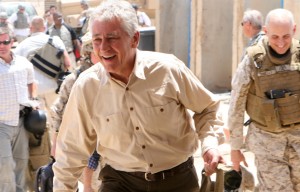
Chuck Hagel arrives at Camp Ramadi, Iraq, for a short visit with U.S. servicemen. Photo by Lance Cpl. Casey Jones via Wikimedia Commons.
As President Obama trotted out the rest of his newly minted foreign policy team last Monday, he signalled an unlikely political character trait: the President of the United States is no Confucian, at least not in orthodox terms.
Looking over Obama’s new foreign policy team, direct agency merit—the hallmark of any good Confucian philosopher—was overlooked for other potentially more important traits in his political appointments. From the iconoclastic Chuck Hagel at Defense to the anodyne John Kerry at State, Obama chose political familiarity over leaving the reigns of the nation’s foreign policy to “next-in-line” technocrats with career-long administrative records.
Obama’s Department of Defense choice stands out as the most visible example of his penchant for known commodities. Hagel, a former Republican Senator from Nebraska, will step into chummed waters during Senate confirmation hearings due to his own insensitivity and the palpable bitterness of his neocon rivals. While Hagel is no lock to survive the fratricidal process, Obama chose him due to their shared anti-Iraq War stance and their personal familiarity. The two men both served on the Senate Foreign Relations Committee and traveled to Afghanistan and Iraq together in the summer of 2008.
While Obama may have been looking for a fight by nominating a firebrand like Hagel, his anointment meant snubbing two other lesser-known candidates. Maybe his most oft-discussed competitor for the job was Michele Flourney—an Oxford graduate—who served parts of three decades at Defense. Flourney would have been the first woman to ever run Defense. Ashton Carter, another Oxford graduate with a long tenure at Defense, was also a contender for the coveted top civilian military job in the country.
While Hagel’s qualifications extend beyond his personal relationship with Obama—he was a Vietnam War veteran and has the business manager background a la Robert McNamara—Obama’s choice undoubtedly revolved around considerations that transcended the simple, but powerful refrain: is this candidate qualified for the job?
From the beginning of his presidency, Obama has been lauded for his Lincoln-esque endeavour to incorporate political foes into the fold, and Hagel will go far toward buttressing this reputation. And yet, Hagel is a political commodity. Much like Kerry at State, Hagel’s impressive political resume provides symbolic resonance and name value first, actual agency experience second.
Less visibly, Obama’s choice of John Brennan, his current Deputy NSA, to head the CIA snubbed Michael Morell—the maid-of-honor to more than one future CIA chief. Morell, the acting director of the CIA before Obama’s announcement and the former deputy director, has served at the CIA for over thirty years in numerous high level capacities. Most notably, he briefed President George W. Bush during every morning, six days a week including on September 11, 2001.
While Brennan’s path to the helm of America’s secretive spy apparatus appears more clear-cut than Hagel’s tangled Senate briar patch, he too is a nod to the utility of loyalty. While Brennan does have a 25-year history with the agency, he was an early Obama acolyte who was part of the administration since its heady campaign days in 2008. Morell, on the other hand, has been a company man and made practical sense as the nation’s top spy.
However, despite these shunted, well-qualified candidates, consolidating control with faithful patrons could pay dividends for Obama and the nation in a challenging global landscape. Faced by such foreign policy conundrums as those posed by the aftermath of the Arab Spring, the plodding foreclosure of the war in Afghanistan, and the potential of a nuclear Iran, fealty among leaders in pivotal agencies could spell a more delicate prosecution of West Wing policy.
While the advantage of political merit over agency merit remains to be seen, Obama has made a clear choice between the two. Indeed, for better or for worse, Obama’s star-studded foreign policy team reaffirms the accepted meaning of political appointment.



